As cash becomes less prominent in the UK, a range of businesses, charities and cash-dependent social groups are figuring out ways to adapt.
Ross Brown, owner of Browns of Brockley in south-east London, one of the capital’s cash-free cafes
I had been on holiday to Stockholm and Denmark with my girlfriend and our son and realised on returning to the UK that we just hadn’t taken out any cash – which I thought was pretty cool considering we went to lots of little, independent coffee shops.
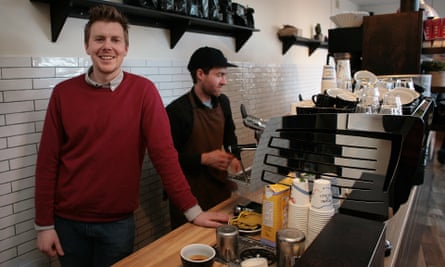
I got to thinking what it would be like if we didn’t use cash any more at work. We already had a relatively high number of card transactions, probably around 60-70% of all transactions. I also hate going to the bank and constantly counting coins and notes every day, and weekly cashing up and banking was at least half a day’s work. There’s also safety – I feel much more comfortable now that we don’t have thousands of pounds stashed somewhere in the building.
In terms of transaction fees, we don’t really lose out because there is an associated cost in accepting cash. I also like the fact that by only accepting cards there is the underlying message to our customers that we declare everything we accept. I’m not anti-tax: I’m proud to employ people, pay them properly and contribute to the economy and society.
Jennifer Smith, director of Ryedale Folk Museum, Hutton le Hole, North Yorkshire
We are still frequently asked by visitors on arrival if we take cards. Perhaps this is more to do with the demographic of our visitors than anything else.
Visitors are often relieved when they hear a yes – because often they are not carrying cash. It’s worth saying that the closure of bank branches nearby has clearly had an effect on people carrying cash – and may be more likely to force more cashless transactions.
Like the rest of the rural businesses I know, we take card transactions using a card machine with a landline. The connection is slow and we often joke with our customers about how things are a little slower out in the countryside.
We are considering moving to a system that needs an internet connection for card payments. There are certainly cost savings with this sort of system. However, I am still reluctant, because of the speed and unreliability of the internet here.Dave Southern, puppeteer and street performer, Cheshire
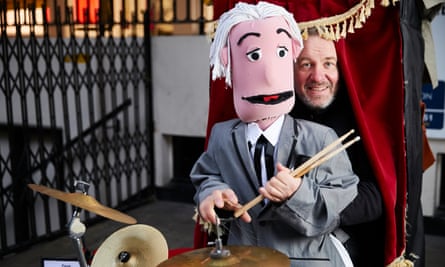
I’ve been a street performer for 40 years and although our artistic community has been discussing the impact of the “cashless society” for the last five years, I’ve yet to see any impact on my income: often, if people don’t have any cash on them, they go to a cashpoint and take some out – then they come back and pay me.
There are buskers who set up PayPal accounts and have QR codes (a contactless payment method scanned by smartphones using a downloadable app) but that’s all a bit hi-tech for me. It also depends on where you’re performing and how long you perform for: in London, where bases are very competitive, costly and you only get an hour to perform, it makes sense to get a QR code. But I’d prefer to stay in Chester and perform in a relaxed way for three hours, and get the same amount in cash as I’d get in a single, pressured hour in London. Having said that, contactless mobile units aren’t ideal in London either because you have to get off your pitch on time and can’t hang around fiddling with contactless payments.
It’s that interaction and relationship which is why cash survives in street performance: sticking a contactless payment device in people’s faces isn’t the same as the familiar hat.
Deborah Myers, head of development, National Gallery
I have seen a fluctuation in cash donations in recent years and so we have put in place arrangements to encourage people to make contactless donations.
In October 2016, we installed contactless donation terminals in the gallery, which took a flat rate donation of £5. It’s been fairly successful: about 3-7% of our donations are now made by card. We’re currently doing a more proactive trial where employees carrying mobile phone payment devices warmly welcome visitors and remind them that the gallery relies on donations. That’s going very well – we’ve definitely seen an increase in donations as a result of it.
People donate more when they pay with a card compared to cash – the average cash donation is £4 to £5 but donations made by card are at the higher end of that and, sometimes, a bit more.
Ilan Slazenger, manager of Clown Town soft play, Finchley, north London
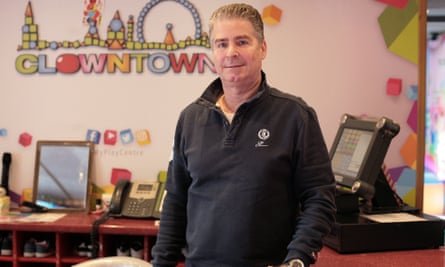
We’ve been going for 21 years and have been cash-only for all that time. Sometimes it’s a nuisance for customers who don’t realise and we feel bad about having to ask them to go to a local cashpoint. We’ve resisted moving to contactless pay because every time we looked into it, we were shocked by how much it cost. The transaction costs for credit cards are the worst: it’s 2.5%, but even debit cards aren’t free and would mean that we would lose all profit on some of the lower cost items in the cafe. We have lots of regular customers for whom a few extra pence on the entrance fee would really make a difference to them.
In the last six months, however, we’ve had a change of heart. This is obviously where things are going and the more we thought of the pros and cons, we decided that it would actually advantage us to allow ourselves to be dragged into the modern age.
For a start, we won’t have cash floating around the venue, or lose money through fraudulent notes, and also won’t have to spend hours counting up the cash and taking it to the bank every week.
Drug dealer
People always go on about how the cashless society will spell the end of drug dealing but although I started selling for cash on the street, my trade has been entirely online for the last couple of years at least. There are different ways customers can pay for drugs on the darknet. They can use Bitcoins, localbitcoins, virtual private networks or [an operating system called] Tails. Buying on the darknet is more risky for dealers than customers.
Compared to selling on the street, the darknet is easier and safer for me – and also more profitable because I sell in bulk rather than dealing with individual pills and small bags of weed. And because I’m selling in bulk, my prices are lower than when I dealt on the street, so it’s a win-win.
I’ve heard some people say the darknet is the next generation of drug dealing. But from where I’m looking, it’s this generation’s way of buying drugs. Cash never comes anywhere near buyer or seller, so all the government’s promises that the cashless society would outlaw drug dealing are a lie.
Margaret Cave, vicar of Christ Church in East Dulwich, south London

We were part of the church’s recent six-month-long national card reader trial and although the trial is over, I’m certainly not giving my card reader back! If I had my way, we’d be a cash-free church.
We use contactless payments for marriage banns money and wedding deposits, taking payments for the church weekend away, and one-off larger donations. And it’s nice just to feel part of the 21st century. When a young couple come in to discuss their marriage banns, which cost £43, I no longer have to send them over the road to the cashpoint.
Also, if people are giving money by card, there’s no question that any of it is going to go missing. It’s more tax effective for them and also helps them donate in a planned way.
John Montague, Big Issue managing directorSellers are increasingly saying to us that they want to go digital because potential customers are increasingly saying they can’t buy the magazine because they’re not carrying cash. This is happening in every major city in the UK where we sell the magazine.
Enabling our vendors to move to a cashless payment system is our top priority for this year but we still don’t know how we can get it done. We’re in talks with MasterCard, Visa and the banks but the problem is finding a solution that works for all our vendors: a system that enables vendors to access their money immediately, so they can pay for a bed that night, rather than wait one to two business days for the money to land in their bank account.
We also need to work out what to do for vendors who don’t have bank accounts, and those who sell papers in areas with poor wifi connectivity.
Rafe Jaffrey, Indian food stallholder at Bloomsbury market in London
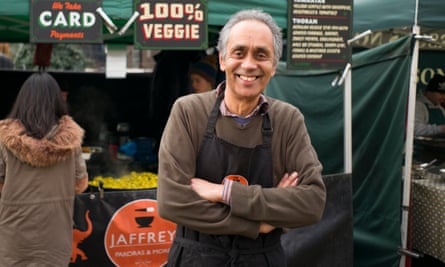
I started using cashless payments in October and it’s been such a success that I don’t know why I waited so long! I’ve been watching increasing numbers of stallholders at Bloomsbury Market using contactless pay over the last few years but assumed it would be really complicated and expensive to set up. I eventually took the plunge because there were ever-increasing numbers of customers who asked me if I took cards – and increasing numbers of those asking where the nearest cashpoint was because they didn’t have any cash on them.
It turns out that it’s not expensive or complicated at all – and I’d say that it immediately increased my turnover by about one-sixth: people just don’t carry cash on them nowadays. Even if they go out intending to go to a farmers’ market, they won’t carry enough cash on them to buy everything they end up wanting.
The only potential problem with contactless payment is if I had my stall at a festival somewhere so obscure that there wasn’t any phone cover. But that would have to be a pretty obscure festival – all the ones I know of have cover.
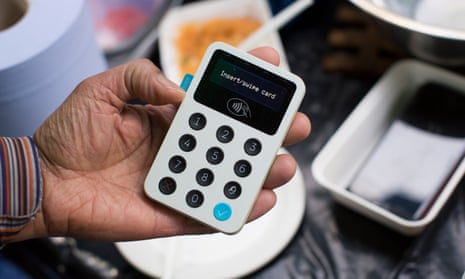
Comments (…)
Sign in or create your Guardian account to join the discussion